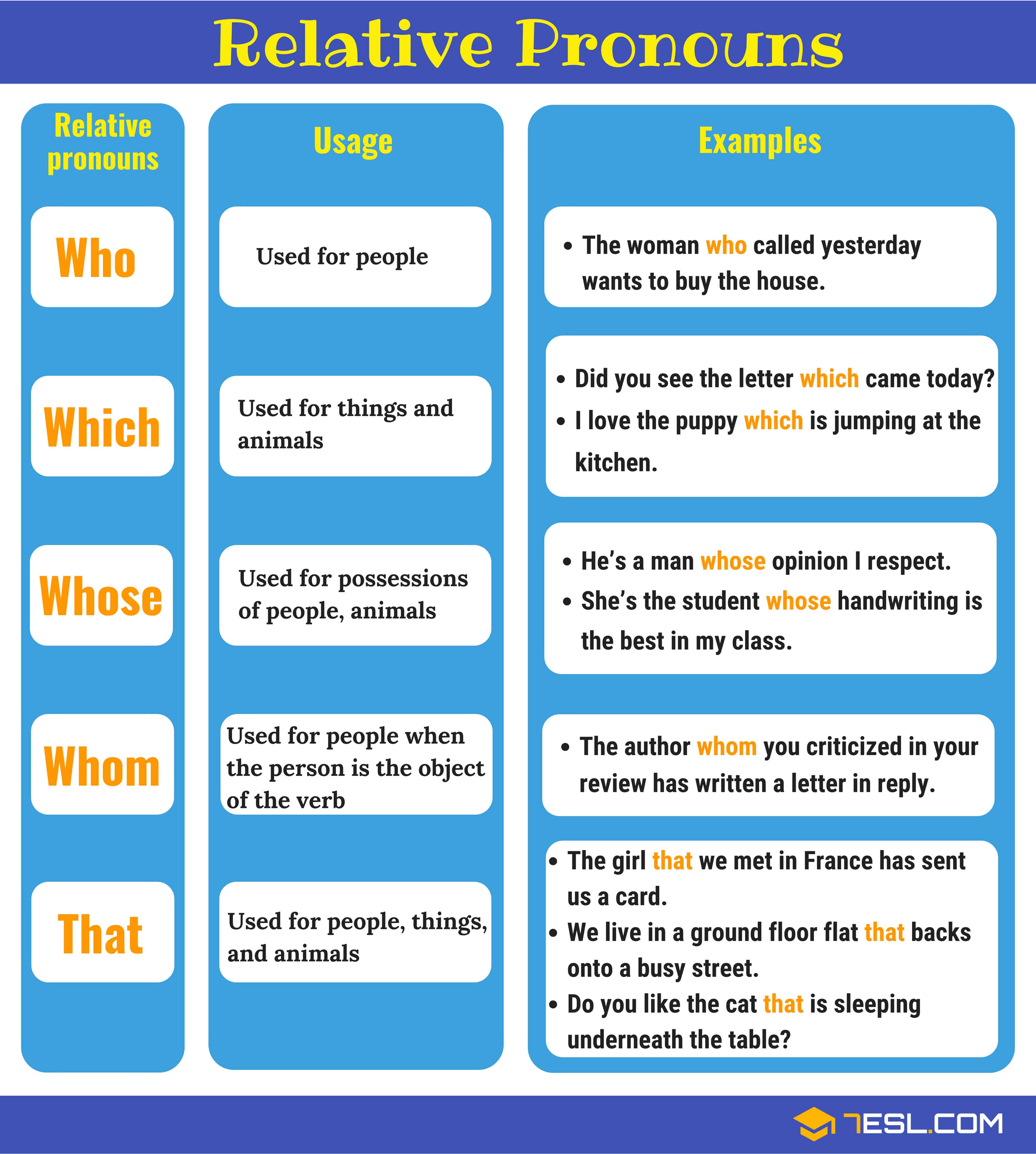Relative Pronouns! (Who, Whom, Whose, Which, That) What is a relative pronoun? We use a relative pronoun to introduce a dependent clause, which is also known as a relative clause, hence the name. These are often the basis of a question in the English language and are commonly used and seen within conversation. It is therefore important that as a student of the English language, you become aware of these pronouns and how to use them.
In this section, we will be looking deeper into what a relative pronoun is, how it can be used in written and spoken language as well as the rules surrounding its use.
What is a Relative Pronoun?
What is a relative pronoun? A relative pronoun is a pronoun that relates to the word that it modifies and is not specific. In English, relative pronouns are who, whom, which, whose, and that.
A relative pronoun links two clauses into a single complex clause. It is similar in function to a subordinating conjunction. Unlike a conjunction, however, a relative pronoun stands in place of a noun.
Relative Pronouns List | Who, Whom, Whose, Which, That
Learn the relative pronouns list with useful grammar rules, example sentences and ESL picture.
Who
- Used for people
The woman who called yesterday wants to buy the house.
- Can act as the subject or the object of the relative clause
Cindy, who taught me English, has just got married. (who refers to Cindy and is the subject of taught in the relative clause)
I discussed it with my brother, who is a lawyer. (who refers to my brother and is the object of discussed in the relative clause)
Which
- Used for things and animals
Did you see the letter which came today?
I love the puppy which is jumping at the kitchen.
- Can act as the subject or the object of the relative clause
His best movie, which won several awards, was about the life of Gandhi. (which refers to the his best movie and is the object of won in the relative clause)
She can’t come to my birthday party, which makes me sad. (which refers to the whole sentence before it)
That
- Used for people, things, and animals (who and which can be replaced by that, which we use commonly in spoken English)
The girl that we met in France has sent us a card. (or who)
We live in a ground floor flat that backs onto a busy street. (or which)
Do you like the cat that is sleeping underneath the table? (or which)
- Can act as the subject or the object of the relative clause
I’ll tell you a secret that is very interesting. (that refers to a secret and is the subject of is in the relative clause)
This is the book that I buy. (that refers to the book and is the object of buy in the relative clause)
Whose
- Used for possessions of people, animals
He’s a man whose opinion I respect.
She’s the student whose handwriting is the best in my class.
Whom
- Used for people when the person is the object of the verb
The author whom you criticized in your review has written a letter in reply.
Note for Relative Pronouns
The best way to know which pronoun to use is to look at the noun before it.
For example:
“This is the car that I drove to Paris.” The noun before “that” is “car”, which is a thing, so we know we can use the pronouns “that” or “which”.
In the sentence “I know a woman who is a doctor.” The noun “woman” is a person, so we know we can use “who” or “that” after it.
Relative Pronoun Reduction
Relative pronouns can sometimes be left out; they are understood but not given in the sentence as in the following example:
I bought a book that my sister recommended.
If the relative pronoun is the subject of its clause, then it must be kept. Otherwise, the relative pronoun can generally be dropped.
Relative Pronouns | Image
Learn useful relative pronouns list with grammar rules and examples.

Relative Pronouns: Learn Useful List and Examples in English








0 Comments